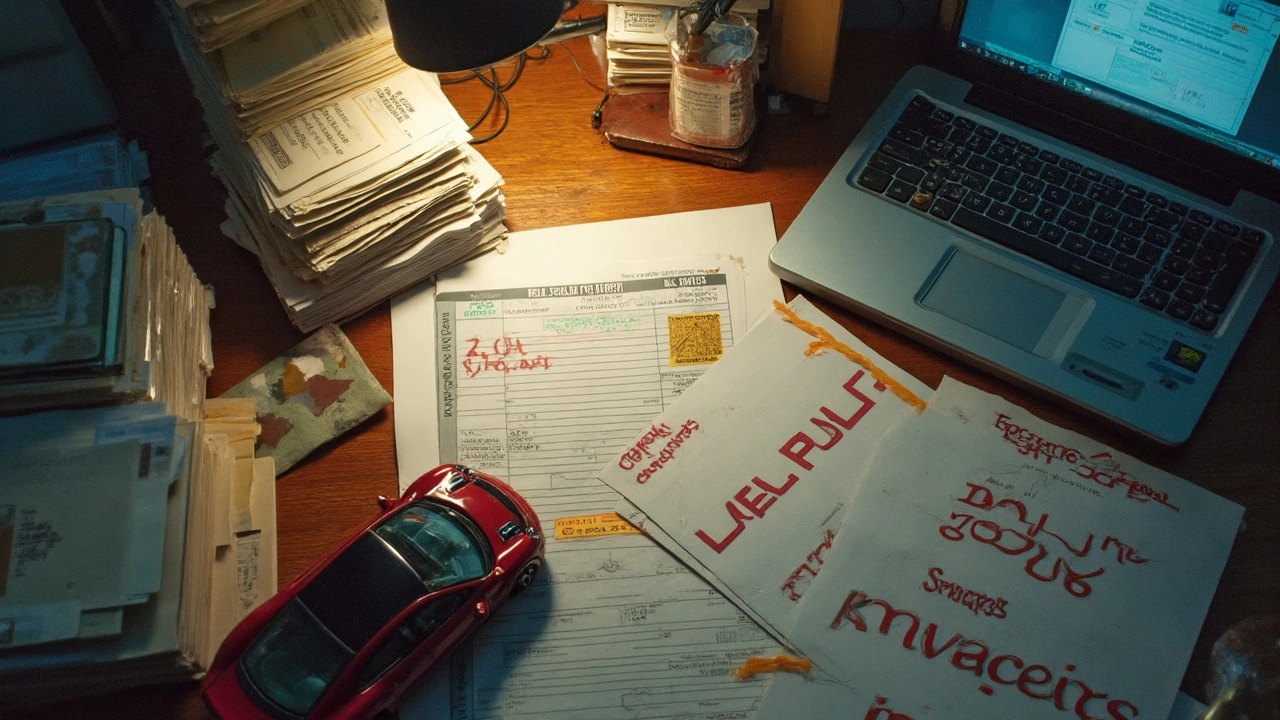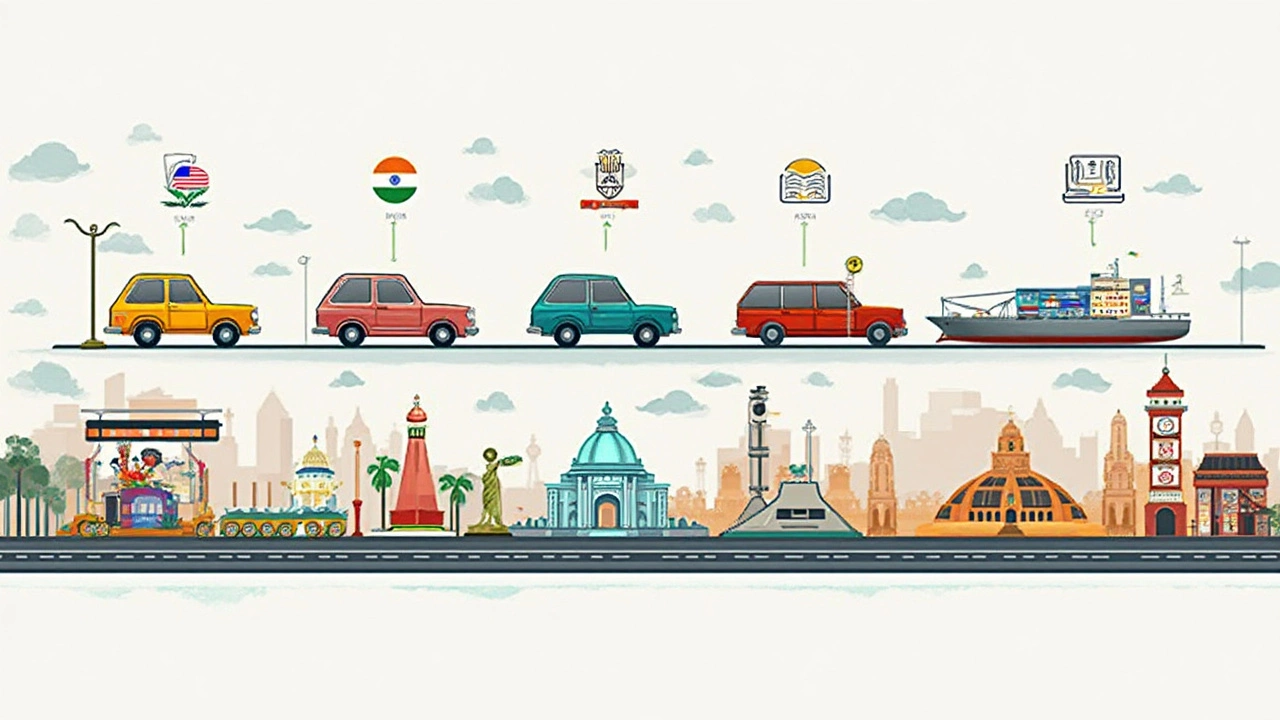The fantasy of driving your made-in-USA car on Indian roads is real—just not cheap. Before you fall in love with that V8 Mustang or Tesla, you need to know what you're signing up for, and it's not just paying for a big boat to travel across oceans. Prices quickly jump from shipping invoices to customs officers poking into your wallet.
First question: how deep are your pockets? There’s no flat rate. The base shipping fee from a U.S. port to India usually starts around $1,500 for roll-on/roll-off (where your car is driven on and off a ship). Container shipping can go higher, anywhere between $2,500 and $5,000 depending on car size and the port. Sounds pricey already? That’s just the tip. Import duty, GST, handling charges, and the exact age and engine capacity of your car—all that stacks up fast, sometimes doubling the cost of your shiny ride.
And don’t forget: India is strict on car imports. If your car is over three years old, or doesn’t meet Indian emission and safety norms, you’re going to hit a wall of regulations. There’s bureaucracy, random fees, and enough paperwork to give anyone a headache. Stick around if you want the real numbers, hidden gotchas, and tricks to save cash and sanity.
- Is importing a car really worth it?
- Breaking down the shipping costs
- Customs duties and taxes in India: what no one tells you
- Hidden fees, paperwork, and common pitfalls
- Smart tips to save money and stay out of trouble
Is importing a car really worth it?
If you’re thinking about car shipping USA to India, ask yourself why you want that car in the first place. Is it for a rare model you can’t buy here? Maybe you're after something that’s got extra flash—or just better quality than what’s sold in the Indian market?
Here’s the reality check. Importing any car is expensive. Most buyers end up spending twice, or even three times, the original value of the car when you add up all the shipping fees, import duty, GST, registration, and surprise expenses. For example, a $30,000 car can easily turn into a ₹50-60 lakh hole in your wallet once it hits Indian soil. That’s a dealbreaker for a lot of folks.
Another thing to consider is resale value. Imported cars don’t always get the premium you’d expect in the used car market here. Spares and service aren’t widely available. You might need to wait weeks if something breaks or—even worse—import those parts again.
- Rules are strict on the car’s age: It must be less than 3 years old for most categories.
- The car has to be right-hand drive, and pass Indian emission and safety rules, which can mean expensive modifications.
- Custom officers love paperwork, and if you miss a detail or a form, your car could get stuck in a warehouse for months, racking up storage charges.
If you’re importing out of pure passion, or want a very specific car that’s just not available in India, sure, it’s your call. But, if you just want a luxury brand or a cool badge, it might make more sense to buy from an official Indian dealer—often with less headache, more warranty, and local service. The math works out better for most people.
Breaking down the shipping costs
Let’s get straight to numbers—shipping a car from the USA to India isn’t one of those things where you just pay for the boat and call it a day. There’s a menu of charges stacking up before your new wheels see Indian roads.
Start with the two main ways to ship: car shipping USA to India is usually done by either roll-on/roll-off (RoRo) or container shipping. RoRo is the economy option. Your car is driven onto a big ship, parked safely, and rolled off in India. Container shipping is pricier since your car goes inside a metal box—good if you want extra safety or are tossing personal stuff in with it.
- RoRo shipping: Usually starts around $1,500 and goes up to $2,500, depending on your ports and car size. It’s bare-bones—no frills.
- Container shipping: Can range from $2,500 up to $5,000 or more if you want a full container to yourself. If you share a container (called less-than-container load or LCL), you split costs but also risk delays if others aren’t ready to ship.
Now, factor in origin and destination charges. U.S. ports like New York, Los Angeles, or Houston have slightly different pricing. Indian ports—Mumbai, Chennai, or Kochi—charge handling fees when your car arrives. You’ll need a local agent at both ends, who charge from $500 to $1,000 each for paperwork and hand-holding.
There are a few more fixed costs:
- Marine insurance: Not required but a smart move. Usually ~1.5% of declared car value.
- Crating or prepping: Sometimes the shipper wants your car battery disconnected and fuel emptied, which might cost a little extra.
- Inland trucking: If your car isn’t at the port already, add $200–$500 to get it there—same on the India side to your home city.
Check out this breakdown of common baseline charges for a mid-size sedan as of 2024:
| Cost Item | Typical Range (USD) |
|---|---|
| RoRo Shipping Fee | $1,500–$2,500 |
| Container Shipping | $2,500–$5,000 |
| Port Handling Charges | $300–$500 |
| Agent Fees (total, both ends) | $1,000–$2,000 |
| Marine Insurance | ~1.5% car value |
| Inland Transport (US & India) | $400–$1,000 |
Add all this up and you’re usually around $4,000–$8,000 before tackling customs or taxes in India. Always get written quotes, check for fine print, and avoid shippers who seem too cheap—it usually comes back to bite with extra fees or delays. Do a background check on your agent. Happy with the math? It gets trickier with the government paperwork, but at least now you know what the shipper’s bill should look like.

Customs duties and taxes in India: what no one tells you
This is where most folks get the biggest shock. When your American car lands in India, you don’t just pay for shipping. The real pain is the taxes. The Indian government charges steep customs duties on imported vehicles—sometimes so high, they can cost more than the car itself.
Here’s the deal: cars imported to India (brand new or used) get hit with several layers of taxes. Let’s break down the big ones:
- Basic Customs Duty: This is the first wall. For completely built-up (CBU) cars, it’s 100% of the car’s value—including shipping and insurance. Electric cars? Slightly better—70% duty.
- Surcharge and CESS: Add another 10% social welfare surcharge on top. Sometimes, an extra 15% CESS applies to luxury vehicles.
- GST (Goods & Services Tax): Once customs is done, another 28% GST piles on. For some SUVs and luxury cars, a compensation CESS (up to 22%) adds fuel to the fire.
If you’re thinking these costs add up fast, you’re right. Here’s a sample bill for a mid-range sedan costing $20,000 (₹16.5 lakh):
| Item | % Rate | Estimated INR |
|---|---|---|
| Car Value (CIF) | - | ₹16,50,000 |
| Basic Customs Duty | 100% | ₹16,50,000 |
| Social Welfare Surcharge | 10% on Duty | ₹1,65,000 |
| GST | 28% | ₹4,62,000 |
| Compensation CESS | 15% | ₹2,47,500 |
| Total (approx) | ₹41,74,500 |
"Importing a car is almost never about just the sticker price; expect to pay taxes that can be double the car’s market value," says Rajesh Menon, Director General at SIAM.
Don’t forget, the rules change for used cars. The same duties apply, but you’ll also need a valuation from Indian customs—so no, you can’t declare a suspiciously low price and sneak your way out. Also, if the car’s over three years old, importing it gets trickier or outright impossible.
The catch? All this is calculated on CIF value: Cost + Insurance + Freight. Even a small change in shipping fees or insurance cost nudges your tax bill higher. Anyone dreaming of car shipping USA to India should run these numbers before even clicking “Bid” online.
Hidden fees, paperwork, and common pitfalls
Just when you think you’ve nailed the budget for shipping a car, hidden costs sneak up on you. People forget these all the time and end up shelling out way more than planned. Here’s what’s lurking under the surface:
- Port handling charges: Indian ports charge extra for unloading, inspection, and storage. These can add ₹15,000 to ₹35,000 depending on the port and how long your car sits there.
- Container de-stuffing: If you use a container, there’s a fee for simply opening it and getting your car out. Not included in your original shipping quote.
- Marine insurance: Not mandatory, but smart. Costs 1-2% of your car’s declared value. Miss this and you’re on your own if there’s damage.
- Handling agent fees: Indian customs doesn’t work directly with individuals, so a customs agent takes care of everything. Their commission usually runs ₹15,000–₹25,000.
- Vehicle cleaning: Indian customs are sticklers about bringing in dirt or plant material. If your car isn’t cleaned properly, you’ll be charged for mandatory cleaning at the port.
- Storage/demurrage: If paperwork delays hold up your car at the port, storage fees rack up daily. It’s about ₹1,000–₹2,000 per day after the free window (usually 3-7 days).
On the paperwork front, expect a mountain of documents. Here’s what’s non-negotiable for clearing customs:
- Bill of Lading (from the shipping company)
- Import Release Order
- Commercial Invoice with full purchase value
- Insurance Certificate
- Pollution and homologation certificates proving your car meets Indian standards
- Your passport and visa details, especially if importing under transfer-of-residence rules
Bureaucratic mix-ups cause most delays. A typo on your Bill of Lading, misdeclared car value, or missing homologation approval can hold things up for weeks and hike up storage bills. It’s the stuff that keeps people up at night.
And watch out for these classic pitfalls:
- Buying cars that don’t meet Indian emission or safety regulations—this is one problem money won’t fix.
- Assuming prices online include all charges—rarely true.
- Forgetting about the car shipping USA to India tax slab: customs duty + GST can add up to 180% of your car’s value, depending on engine capacity and age.
| Fee/Document | Typical Cost (INR) | Notes |
|---|---|---|
| Port Handling | ₹15,000–₹35,000 | Varies by port, not all-included |
| Customs Agent | ₹15,000–₹25,000 | Mandatory for paperwork |
| Storage Fees | ₹1,000–₹2,000/day | After 3-7 free days |
| Marine Insurance | 1–2% of car value | Optional but smart |
| Vehicle Cleaning | ₹3,000–₹5,000 | If needed by customs |
Catching these costs early is the real trick to not getting burned. Double-check your paperwork with a reliable agent. Budget extra for anything that sounds fuzzy or open-ended in your quotes. That’s where people get bitten.

Smart tips to save money and stay out of trouble
If you’re serious about bringing a car from the USA to India, spending less and avoiding headaches is all about planning and knowing how to dodge the classic import traps. Here’s what really works:
- Pick the right port. Mumbai and Chennai are the busiest for car imports. Picking one of them usually brings faster customs clearance—you might even save on handling charges by avoiding smaller ports.
- Use “roll-on/roll-off” for shipping if your car’s valuable but not exotic. Container shipping is pricier and usually only makes sense if your car is a super-expensive classic or you’re importing more than one. Typical RoRo shipping costs are $1,500–$2,500, while container rates can be up to $5,000.
- Make your car meet Indian rules before shipping. Get emissions and safety checks (like EPA and DOT compliance) done in the US. Fixing this stuff in India can triple your expenses, and sometimes Indian authorities will just send the vehicle back!
- Arrange a local customs agent. They know the documentation (like Bill of Lading, Invoice, Certificate of Origin), and can help you sidestep bribes and weird delays.
- Import as a returning NRI, if possible. If you’re moving back after staying abroad for two years, you can bring one car as a “personal effect.” Duty discounts are rare, but paperwork moves quicker and you cut a lot of drama.
- Don’t ship junk. If your car is more than 3 years old, customs will reject it outright. Always check the model year on your registration, not just the manufacturing year.
Set your budget with eyes wide open. Here’s a quick look at typical out-of-pocket costs:
| Item | Estimated Cost (USD) |
|---|---|
| Shipping (RoRo) | 1,500 - 2,500 |
| Container Shipping | 2,500 - 5,000 |
| Import Duty & GST | 60–100% of car value |
| Handling & Port Charges | 500 - 1,000 |
| Customs Agent Fees | 200 - 500 |
| Miscellaneous (police clearance, local RTO) | 100 - 300 |
One last no-brainer: keep every document related to your car shipping USA to India safe and in order. Customs officers love paperwork, and any missing form can cost days or even weeks. Label every file, email receipts, and if you’re the forgetful type, back up everything on your phone.
And hey, don’t wire full shipping payment in advance—pay part upfront, then the rest on delivery to the port. That way, you have leverage if something goes sideways.
